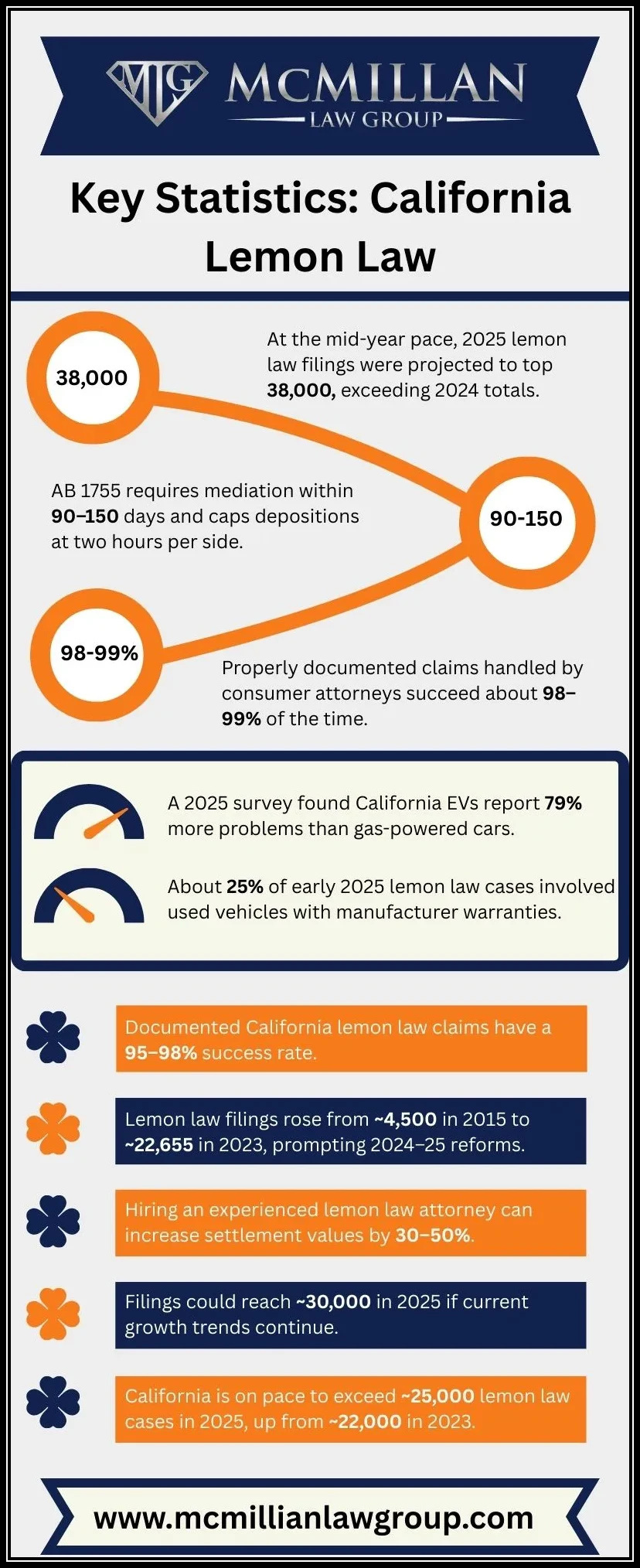The Song-Beverly Consumer Warranty Act, commonly referred to as California’s Lemon Law, stands out as a strong consumer protection statute within the United States. This law enables purchasers of vehicles to obtain recourse for faulty products that do not adhere to expected quality and performance criteria. Throughout its history, numerous significant legal cases have influenced how this law is understood and applied, establishing a system that advocates for consumers while ensuring manufacturers are held responsible.
Understanding the Basics of California Lemon Law
Prior to exploring case law, it’s important to grasp the basics of California’s Lemon Law. This legislation pertains to both new and pre-owned vehicles that are sold or leased in California and come with a valid manufacturer’s warranty. Consumers can seek remedies if:
- If the manufacturer or an authorized dealer is unable to fix a significant defect after multiple reasonable attempts, they are deemed unable to provide a solution.
- The flaw greatly affects the vehicle’s functionality, worth, or safety.
- The warranty on the vehicle is still valid while it is being repaired.
Key Precedents Shaping California Lemon Law
Key precedents in California Lemon Law cases have shaped consumer rights and strengthened manufacturer accountability, with California Lemon Law attorneys playing a crucial role in securing fair outcomes.
1. Krotin v. Porsche Cars North America, Inc. (1995)
In this instance, the California Court of Appeal examined what constitutes substantial impairment. The plaintiff, Krotin, encountered a flaw in his Porsche that affected its safety and functionality. The court sided with Krotin, highlighting that for a defect to be considered under Lemon Law, it is not necessary for the vehicle to be entirely non-functional.
This ruling established that any flaws affecting safety, worth, or overall satisfaction are sufficient to trigger protections under the Lemon Law. For consumers, this indicates that even minor yet ongoing problems can serve as grounds for a claim.
2. Jiagbogu v. Mercedes-Benz USA, LLC (2004)
This situation revolved around the idea of what constitutes a reasonable number of attempts to repair. Jiagbogu’s Mercedes experienced ongoing engine troubles, and even after multiple attempts at repairs, the problems continued. The manufacturer contended that more attempts were necessary to resolve the defect.
The court sided with Jiagbogu, asserting that manufacturers are required to promptly rectify defects within a reasonable period. This ruling highlighted that manufacturers cannot prolong the resolution process by repeatedly attempting repairs, thereby empowering consumers to more confidently claim their rights.
3. Lukather v. General Motors, LLC (2010)
The situation involving Lukather highlighted the necessity for proper transparency concerning vehicle flaws. After buying a car, Lukather discovered it had a prior record of manufacturing issues. The court determined that GM did not adequately inform consumers about these defects, which breached the protections offered by Lemon Law.
This decision strengthened the requirements for manufacturers to clearly disclose the state of their vehicles. For buyers, this sets a standard that highlights the necessity of thorough inspection reports and records when acquiring a vehicle.
4. Mexia v. Rinker Boat Co. (2009)
While this case doesn’t pertain specifically to automobiles, it had a major influence on California Lemon Law Lawyer by clarifying the length of implied warranties. The court determined that, according to the Song-Beverly Act, implied warranties do not terminate when the express warranty ends; rather, they remain in effect for the reasonable life expectancy of the item.
This decision broadened the range of Lemon Law claims for vehicle owners, permitting defects identified after the original warranty period to be eligible under specific conditions.
5. Martinez v. Kia Motors America, Inc. (2015)
In this instance, Martinez asserted that her Kia Sorento was experiencing major transmission problems. The manufacturer contended that the defect did not significantly affect the vehicle’s value or usability to qualify for Lemon Law safeguards.
The court ruled in favor of Martinez, highlighting that issues impacting a vehicle’s resale value are included under Lemon Law provisions. This decision strengthened the notion that financial losses, like reduced value, can serve as legitimate grounds for claims, regardless of whether the vehicle is still operable.
Insights for Building a Strong Lemon Law Case
The examples mentioned provide important takeaways for buyers dealing with faulty cars. Here’s how you can use this knowledge to bolster your Lemon Law case:
- Keep Comprehensive Records: It is essential to keep a detailed record of all repair efforts, service documentation, and interactions with the dealership or manufacturer. Well-maintained records highlight the ongoing issues and the frequency of repair attempts, both of which are vital for Lemon Law claims.
- Understand “Substantial Impairment: According to the ruling in Krotin v. Porsche, even seemingly trivial flaws can be considered significant if they have a considerable effect on safety, functionality, or worth. It is advisable to consult with an attorney to assess the impact of the defect on your vehicle in these aspects.
- Be Vigilant About Disclosure: The case of Lukather v. General Motors underscores the necessity of transparency in transactions. It is crucial to meticulously examine a vehicle’s history prior to making a purchase and to identify any discrepancies.
- Act Promptly: Acting quickly on repairs or submitting a claim is crucial. The case of Jiagbogu v. Mercedes-Benz illustrates that while manufacturers have a responsibility to resolve problems swiftly, consumers also need to respond in a timely manner to protect their rights.
Manufacturer Accountability and Consumer Empowerment
The California Lemon Law fulfills two key roles: safeguarding consumers and motivating manufacturers to uphold quality standards. The cases reviewed in this discussion illustrate how courts have repeatedly upheld consumer rights and held manufacturers responsible for their products.
For instance, the case of Mexia v. Rinker Boat Co. establishes that consumers have the right to hold manufacturers responsible beyond the expiration of the original warranty period. Likewise, the Martinez v. Kia Motors case highlights the financial consequences of product defects, urging manufacturers to rectify problems that negatively affect a vehicle’s worth.
Important legal cases in California’s Lemon Law have profoundly influenced the regulatory framework, protecting consumers from being stuck with faulty cars. Notable examples such as Krotin v. Porsche and Jiagbogu v. Mercedes-Benz demonstrate the judiciary’s commitment to safeguarding consumer interests.




